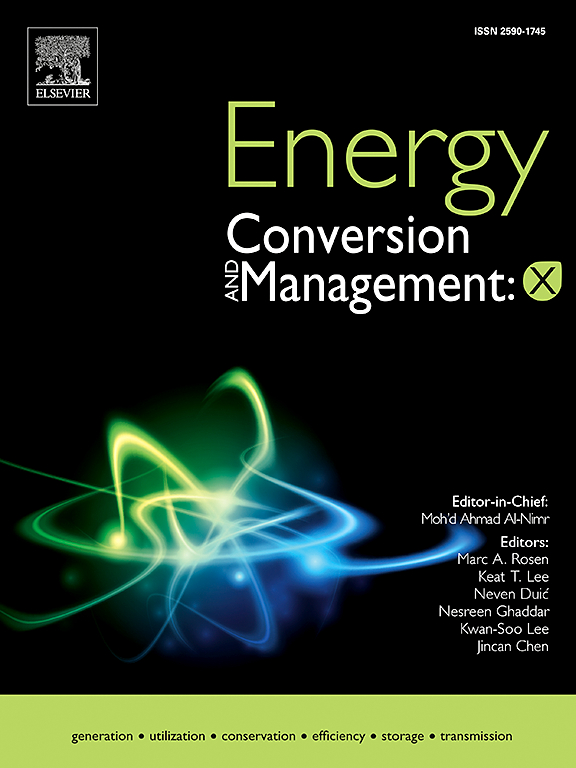基于优化分解和深度学习的超短期风电预测方法
IF 7.6
Q1 ENERGY & FUELS
引用次数: 0
摘要
准确的风电功率预测是保证电力系统稳定、提高风电并网效率的关键。提出了一种新的超短期风电预测模型。首先,利用Pearson和Spearman相关系数(PCC/SCC)对风电数据进行特征选择,剔除冗余特征;然后,提出了一种改进的基于减平均的优化器(ISABO)来优化变分模态分解(VMD)的参数,将原始风电序列分解为更平稳的子分量。最后,结合Dish-TS通用模式和概率稀疏自关注机制,提出了一种增强的多尺度图网络(MSGNet)预测框架。实验结果表明,所提出的FS-ISABO-VMD-IMSGNet模型具有较高的预测精度,其平均绝对误差(MAE)降低了28.2%,优于目前最先进的基于vmd的DCInformer模型。该研究为维护电力系统稳定提供了更为可靠的依据。本文章由计算机程序翻译,如有差异,请以英文原文为准。

Ultra-short-term wind power forecasting method based on optimized decomposition and deep learning
Accurate wind power forecasting is essential for ensuring power system stability and improving wind integration efficiency. This paper presents a novel ultra-short-term wind power prediction model. First, feature selection is performed on wind power data using Pearson and Spearman correlation coefficients (PCC/SCC) to eliminate redundant features. Then, an Improved Subtraction-Average-Based Optimizer (ISABO) is proposed to optimize the parameters of Variational Mode Decomposition (VMD), decomposing the raw wind power sequences into more stationary subcomponents. Finally, an enhanced Multi-Scale Graph Network (MSGNet) is introduced by incorporating the Dish-TS general paradigm for mitigating distribution shift and a probabilistic sparse self-attention mechanism, resulting in the IMSGNet prediction framework. Experimental results show that the proposed FS-ISABO-VMD-IMSGNet model achieves superior forecasting accuracy, outperforming the state-of-the-art VMD-based DCInformer by reducing the Mean Absolute Error (MAE) by 28.2%. This study provides a more reliable foundation for maintaining power system stability.
求助全文
通过发布文献求助,成功后即可免费获取论文全文。
去求助
来源期刊

Energy Conversion and Management-X
Multiple-
CiteScore
8.80
自引率
3.20%
发文量
180
审稿时长
58 days
期刊介绍:
Energy Conversion and Management: X is the open access extension of the reputable journal Energy Conversion and Management, serving as a platform for interdisciplinary research on a wide array of critical energy subjects. The journal is dedicated to publishing original contributions and in-depth technical review articles that present groundbreaking research on topics spanning energy generation, utilization, conversion, storage, transmission, conservation, management, and sustainability.
The scope of Energy Conversion and Management: X encompasses various forms of energy, including mechanical, thermal, nuclear, chemical, electromagnetic, magnetic, and electric energy. It addresses all known energy resources, highlighting both conventional sources like fossil fuels and nuclear power, as well as renewable resources such as solar, biomass, hydro, wind, geothermal, and ocean energy.
 求助内容:
求助内容: 应助结果提醒方式:
应助结果提醒方式:


